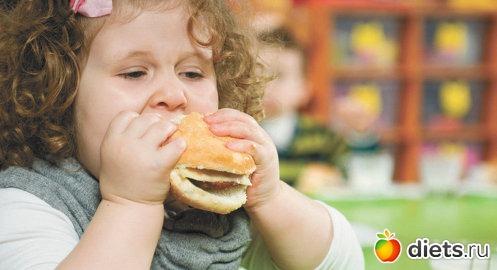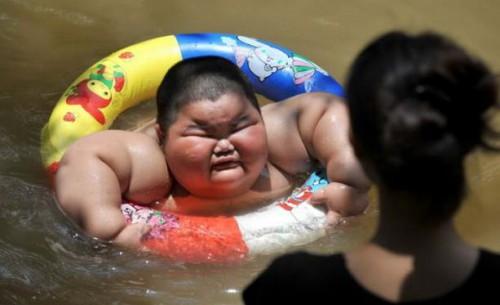724
How thick do babies come from?

Why in Russia 25% of boys and 20% girls weigh much more than the norm, and how to fight it? The number of obese children constantly and dangerously increasing in Russia. In this sense, we are a little different from our European and American counterparts - this trend is observed almost all over the world. At present, Russia occupies an intermediate position between the absolute leaders of this sad statistics - Greece, USA, Mexico, Italy and the UK, and the absolute outsiders - all Asian countries (Japan, Korea, China), Switzerland, Norway, Poland and the Czech Republic
.

Being born into the world, a person has a very clearly unconscious idea of what he needs for a healthy and nutritious food. In that case, if in the process of its power not to intervene.
But the more advanced calls itself the world, the more adults are inclined to interfere in the process of nutrition, subordinating it to his convenience, the popular opinion of pediatricians, standards development and the ratings tables.
In 1928, Clara Davis, was held the most famous, large-scale and long diet experiment century.
Davis, for 6 years, watched little children (aged 6 to 11 months) guests special dietary kindergarten, organized for the purposes of this experiment. Participants in the experiment were children of single mothers, who have not been able to maintain and support their children and the children of teenage mothers of unwanted pregnancies. Most of the children suffer severe anemia and significant weight deficiency, rickets and other disorders, usually accompanied by poor nutrition. Every meal and every bite eaten baby was recorded for six years, for a total of about 38 thousand records "food diary».
The food offered to children, but never imposed. Food spread in certain places, in front of children. Nurses caring for babies who can not yet walk, never offered food to children active. Only if the child is quite clearly stretched to a certain kind of food, he got it in a spoon. If the child refused to eat, spoon immediately cleaned.
Children who are able to walk independently, were free to come and choose any type and combination of food that they are to taste. The offered food was absolutely natural, every kind of food was a single product - a combination and mix of products is not allowed. Why? To make sure that the child has chosen a concrete, specific product for its nutritional value. Therefore, in the present experiment diet whole grains, but there was no bread. All kinds of food were unsalted, salt was supplied in a separate bowl, like any other product, and children can choose it if you want.
The first experimental discovery, now - a scientific fact about child nutrition, is that children consume an uneven number of calories during the day, week or month. One day they can eat a double daily calories, the other barely will type and half. One day calorie eaten could reach the norm due to the consumption of a small amount of high caloric value of foods, and the other -. Due to the low-calorie, eaten in large volume
None of the styles of the power of small subjects did not match the nutritional standards developed by the Institute of Pediatrics for their age, and no one diet was not like the other. Each child ate differently.
It was found that, compared with the statistics of other children's institutions that participated in the experiment, children, little and rarely get sick and experiencing typical for this age minor troubles with health. Constipation were unknown in this kindergarten. There were no cases of vomiting or diarrhea. During the experiment, viral infections such as influenza, that sick children were from low temperature and lasted no more than 3 days.
Of course, the study participants were regular and detailed medical examination, which revealed an increase in hemoglobin in the blood to the level of standards, normalization of calcium and phosphorus, an excellent calcification children's bones in those before the experiment suffered from rickets, in some cases - in advanced. The most striking thing is that the children gained weight to the required age norms, but no more. Of course, in the group were more and more thoroughly thin folded participants, but no depletion or obesity was observed. One of the doctors who participated in a medical evaluation of the participants, later wrote an article in the prestigious journal Pediatrics (Brennemann, Psychologic aspects of nutrition in childhood, J. Pediatr, Aug. 1932, 1 (2):.. P 152), calling the pilot group " a group of the most healthy physically and behaviorally representatives of the human species, "he had ever seen.
Later, it has been a number of nutritional experiments with children showed exceptional ability "unspoiled" nutritional requirements of the human body to regulate the level and type of food intake.
As it became clear from the experiment described by Davis, regulation of eating - that it is, how much and when - it should ideally be completely given to the child, that is, carried out internally by itself. In fact, we are constantly eksternaliziruem eating behavior of children, in other words - we derive its management in the external sphere, to us, adults, it was convenient, or because we believe it is correct. This begins as early as infancy: still pediatricians often recommend "teach" babies have not when they are hungry and when it is convenient to the mother - for example, "the purpose of weaning from the night feedings." Further more. The child is growing, and its attempt to regulate the behavior of food: "You will behave well - get ice cream." It is interesting that a few decades earlier, when the abundance of food was not so great, children rewarded hugs, kisses, caresses. Today, candy increasingly replaces kiss.
The situation is exacerbated when a "good behavior" is meant "to eat up the soup." For food baby food reward. As a result, the children listen to wean the body signals to the feeling of hunger and the needs in some form or other foods, and learn to respond to external stimuli as triggers to start eating.
Despite the fact that a quarter of the boys and a fifth of girls in Russia is much heavier than the norm, and be fat - and unpopular teenager - almost tragic, the cult of good appetite in the child does not lose relevance. In the first year of an infant's life, and its main advantage is the pride of weight gain, and most important the tragedy, generating a continuous maternal guilt, a lack of appetite of the child does not want to eat solid foods, in accordance with the instructions of the leading pediatricians.
And only if the task is "to feed the child" is solved, the mother can breathe and think about something else. Unfortunately, feeding through force and against the will - far more common variant nutritional status of children in Russia than in other countries. The child quickly learns that the food - something incredibly important, and to be good - you need to eat.
LIFE WITHOUT VACCINATION: An Interview with a pediatrician and mother of many children
Very carefully buy vegetables and fruits.
























